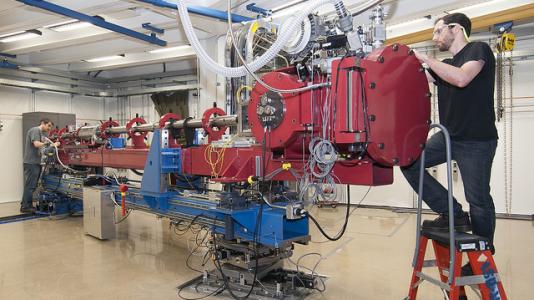
Short time scales in support of the National Nuclear Security Administration’s (NNSA’s) vital national security missions. NNSA, the Department of Energy’s (DOE’s) Argonne National Laboratory and Washington State University (WSU) will dedicate the new Dynamic Compression Sector (DCS) in a ceremony hosted by WSU this week. DCS is a new installation located at Argonne’s Advanced Photon Source (APS), a DOE Office of Science User Facility near Chicago, Ill.
“DCS is an exciting and visionary undertaking that adds a national security capability to an existing DOE laboratory,” said acting Deputy Administrator for NNSA’s Defense Programs Phil Calbos. “Work at DCS will lead to discovery-class science and address important materials issues for the Stockpile Stewardship Program.”
DCS is funded by NNSA and is managed as a partnership between WSU and APS. DCS will help address challenges related to the nation’s energy and national security needs, understand the structure of planetary interiors and help make new, lightweight materials for industrial, aerospace and automotive applications.
DCS allows researchers, for the first time, to make movies of the behavior of materials subjected to extreme conditions through tunable, high-energy X-ray pulses for viewing condensed matter changes at the microscopic level during a shock compression event.
“DCS supports a broad range of multidisciplinary research and will allow scientists to observe material behaviors and the underlying microscopic mechanisms using techniques that have not been possible before,” said Yogendra Gupta, director of the WSU Institute for Shock Physics.
“All of us at Argonne and the APS are delighted to formally welcome DCS to our community,” said APS director Stephen Streiffer. “Users of DCS are already publishing exciting results, and we’re eager to see what the future holds for this valuable national scientific resource.”
The fundamental dynamic compression science enabled by DCS will support NNSA’s mission to ensure the U.S. nuclear stockpile is safe, secure and effective, with the added benefit of a relatively rapid turnaround time per experiment. DCS’ experimental capabilities will also support Department of Defense national security research.
Established by Congress in 2000, NNSA is a semi-autonomous agency within the U.S. Department of Energy responsible for enhancing national security through the military application of nuclear science. NNSA maintains and enhances the safety, security and effectiveness of the U.S. nuclear weapons stockpile without nuclear explosive testing; works to reduce global danger from weapons of mass destruction; provides the U.S. Navy with safe and effective nuclear propulsion; and responds to nuclear and radiological emergencies in the U.S. and abroad. Visit https://nnsa.energy.gov/ for more information.
Washington State University has a long history of working successfully with NNSA and conducting world-leading research in dynamic compression science. Using state-of-the-art experimental and computational capabilities, ISP scientists conduct interdisciplinary research spanning the fields of physics, chemistry, materials science, solid mechanics and planetary sciences. DCS will enable ISP faculty and graduate student researchers to study matter under physical conditions previously inaccessible in the laboratory.
Argonne’s Advanced Photon Source is a DOE Office of Science national user facility. The APS is a stadium-sized X-ray microscope that provides ultra-bright, high-energy X-ray beams and allows more than 5,000 scientists per year to conduct research in nearly every scientific discipline to see structures at the atomic level. APS enables understanding of the form and function of biological proteins, allowing scientists to see chemical processes happen at the nanoscale and to study arrangements of molecules and atoms.
Argonne National Laboratory seeks solutions to pressing national problems in science and technology. The nation’s first national laboratory, Argonne conducts leading-edge basic and applied scientific research in virtually every scientific discipline. Argonne researchers work closely with researchers from hundreds of companies, universities, and federal, state and municipal agencies to help them solve their specific problems, advance America’s scientific leadership and prepare the nation for a better future. With employees from more than 60 nations, Argonne is managed by UChicago Argonne, LLC for the U.S. Department of Energy’s Office of Science.
The U.S. Department of Energy’s Office of Science is the single largest supporter of basic research in the physical sciences in the United States and is working to address some of the most pressing challenges of our time. For more information, visit the Office of Science website.